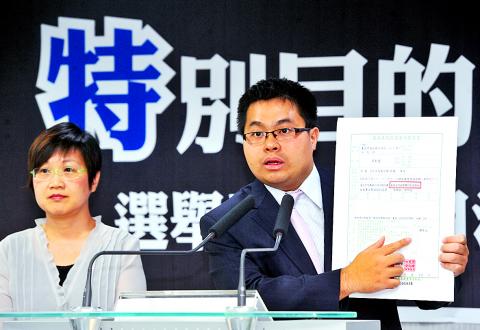The Special Investigation Division (SID) of the Supreme Prosecutors’ Office’s subpoena of Democratic Progressive Party (DPP) Secretary-General Joseph Wu (吳釗燮) could be illegal and politically motivated, the DPP said yesterday.
“Wu was listed as an ‘interested party’ in a recent subpoena from the SID... on which no details of the case were listed. The division appears to have violated the Code of Criminal Procedure (刑事訴訟法),” DPP spokesperson Huang Di-ying (黃帝穎) told a press conference.
According to the code, the SID should have listed the origin of the case and the identity of the subpoenaed — be it a witness or a defendant, Huang said, adding that “interested party” was not an identity as regulated by the code, which means that the subpoena could be illegal.

Photo: Chien Jung-fong, Taipei Times
The DPP also suspected that there is a hidden agenda behind the investigation and the subpoena because the SID “is notorious for its interference in several high-profile political cases in recent years,” the spokesperson said.
That is why the division has earned the nickname “the investigation division with special motives,” he added.
“That is also why we cannot help but wonder whether there is any political agenda behind Wu’s subpoena, as the division chose to launch an investigation into a high-ranking official of the opposition party in the run-up to the seven-in-one elections in November,” Huang said.
DPP spokesperson Hsu Chia-ching (徐佳青) said Wu would discuss the matter with the party and his lawyers before deciding whether to report to the SID.
With regards to claims of a planned purge targeting high-ranking DPP officials, Hsu said the party preferred not to speculate or over-analyze the case at the moment, but the division’s past investigations against opposition politicians and the fact that the subpoena was issued on June 26, about a month after DPP Chairperson Tsai Ing-wen (蔡英文) assumed the part post, did not give the party any reason for optimism.
“Many DPP members have been able to survive judicial oppression, but their innocence was proven only after years of court appearances and trials. We hope nothing like this will happen before the year-end elections and the presidential election in 2016,” Hsu said.
In response, the SID denied that there were any political considerations involved in the investigation, the Chinese-language Liberty Times (the Taipei Times’ sister newspaper), reported.
The SID said the ongoing case in which Wu is involved is related to a violation of the Classified National Security Information Protection Act (國家機密保護法), but that the division could not go into details.
Chinese Nationalist Party (KMT) spokesperson Charles Chen (陳以信) said the DPP had made allegations against the KMT and the judiciary without any solid evidence.
“The accusation itself is a cheap political maneuver orchestrated by the DPP,” Chen said.
The rumor that the KMT is trying to “annihilate” Tsai with the judicial investigation is a DPP smear campaign, which shows that the party wants to achieve its political goals even at the cost of losing public trust in the judicial system, the spokesperson said.

CHAOS: Iranians took to the streets playing celebratory music after reports of Khamenei’s death on Saturday, while mourners also gathered in Tehran yesterday Iranian Supreme Leader Ayatollah Ali Khamenei was killed in a major attack on Iran launched by Israel and the US, throwing the future of the Islamic republic into doubt and raising the risk of regional instability. Iranian state television and the state-run IRNA news agency announced the 86-year-old’s death early yesterday. US President Donald Trump said it gave Iranians their “greatest chance” to “take back” their country. The announcements came after a joint US and Israeli aerial bombardment that targeted Iranian military and governmental sites. Trump said the “heavy and pinpoint bombing” would continue through the week or as long

TRUST: The KMT said it respected the US’ timing and considerations, and hoped it would continue to honor its commitments to helping Taiwan bolster its defenses and deterrence US President Donald Trump is delaying a multibillion-dollar arms sale to Taiwan to ensure his visit to Beijing is successful, a New York Times report said. The weapons sales package has stalled in the US Department of State, the report said, citing US officials it did not identify. The White House has told agencies not to push forward ahead of Trump’s meeting with Chinese President Xi Jinping (習近平), it said. The two last month held a phone call to discuss trade and geopolitical flashpoints ahead of the summit. Xi raised the Taiwan issue and urged the US to handle arms sales to

State-run CPC Corp, Taiwan (CPC, 台灣中油) yesterday said that it had confirmed on Saturday night with its liquefied natural gas (LNG) and crude oil suppliers that shipments are proceeding as scheduled and that domestic supplies remain unaffected. The CPC yesterday announced the gasoline and diesel prices will rise by NT$0.2 and NT$0.4 per liter, respectively, starting Monday, citing Middle East tensions and blizzards in the eastern United States. CPC also iterated it has been reducing the proportion of crude oil imports from the Middle East and diversifying its supply sources in the past few years in response to geopolitical risks, expanding

Pro-democracy media tycoon Jimmy Lai’s (黎智英) fraud conviction and prison sentence were yesterday overturned by a Hong Kong court, in a surprise legal decision that comes soon after Lai was jailed for 20 years on a separate national security charge. Judges Jeremy Poon (潘兆初), Anthea Pang (彭寶琴) and Derek Pang (彭偉昌) said in the judgement that they allowed the appeal from Lai, and another defendant in the case, to proceed, as a lower court judge had “erred.” “The Court of Appeal gave them leave to appeal against their conviction, allowed their appeals, quashed the convictions and set aside the sentences,” the judges